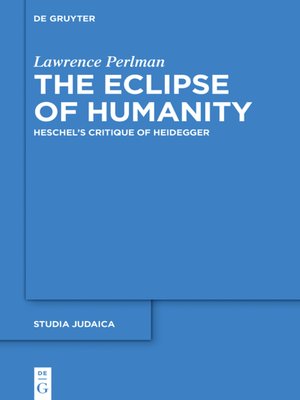The Eclipse of Humanity
ebook ∣ Heschel's Critique of Heidegger · Studia Judaica
By Lawrence Perlman

Sign up to save your library
With an OverDrive account, you can save your favorite libraries for at-a-glance information about availability. Find out more about OverDrive accounts.
Find this title in Libby, the library reading app by OverDrive.



Search for a digital library with this title
Title found at these libraries:
| Library Name | Distance |
|---|---|
| Loading... |
It has been widely assumed that Heschel's writings are poetic inspirations devoid of philosophical analysis and unresponsive to the evil of the Holocaust. Who Is Man? (1965) contains a detailed phenomenological analyis of man and being which is directed at the main work of Martin Heidegger found primarily in Being and Time (1927) and Letter on Humanism (1946).
When the analysis of Who Is Man? is unapacked in the light of these associations it is clear that Heschel rejected poetry and metaphor as a means of theological elucidation, that he offered a profound examination of the Holocaust and that the major thrust of his thinking eschews Heidegerrian deconstruction and the postmodernism that ensued in its phenomenological wake.
Who Is Man? contains direct and indirect criticisms of Heidegger's notions of 'Dasein', 'thrownness', 'facticity' and 'submission' to name a few essential Heideggerian concepts. In using his ontological connective method in opposition to Heidegger's 'ontological difference', Heschel makes the argument that the biblical notion of Adam as a being open to transcendence stands in oppostion to the philosophical tradition from Parmenides to Heidegger and is the only basis for a redemptive view of humanity.







